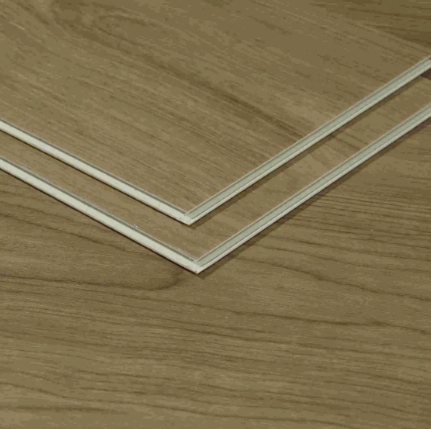التركيب الأساسي والكثافة في أرضيات SPC
مواد القلب في مركب الحجر البلاستيكي (SPC)
SPC هو اختصار لعبارة Stone Plastic Composite، ويتم تصنيعه من خلال دمج الحجر الجيري المطحون مع راتنج PVC لإنتاج الجزء الرئيسي من الأرضية. ما الذي يجعل هذه الخلطة مميزة إلى هذا الحد؟ إنها تكوّن قلبًا يتميّز بالمتانة ويتيح درجة معينة من المرونة عند الحاجة، مما يمنح الأرضيات SPC خصائصها الممتازة. كما يبقى هذا النوع من المواد مستقرًا بمرور الوقت، ويمنع انتقال الضوضاء بشكل جيد بين الطوابق، ولا يتضرر من المياه كما هو الحال مع العديد من الأرضيات الأخرى. وبفضل هذه الخصائص، فإن SPC خيار ممتاز يناسب مختلف الأماكن بدءًا من الشقق الصغيرة حيث يبحث الأشخاص عن أرضيات سهلة الصيانة، وصولًا إلى المباني المكتبية الكبيرة التي تتعرض لحركة مرور كثيفة. وقد أظهرت بعض الاختبارات أن هذه الخلطة المحددة تساعد في منع تشوه الأرضية أو انحنائها، وهي مشكلة تحدث بشكل متكرر مع الأرضيات الخشبية التقليدية. وعندما يختار المصنعون مواد قلبية عالية الجودة تشبه تلك المستخدمة في منتجات SPC، فإنهم يلاحظون عمومًا أن الأرضيات تدوم لفترة أطول وتؤدي أداءً أفضل في الظروف العادية.
لماذا يهم الكثافة: معيار 2000 كجم/م³
من حيث الأرضيات SPC، فإن الكثافة تلعب دوراً كبيراً. يتفق معظم الخبراء على أن الكثافة المثالية يجب أن تكون حوالي 2000 كجم لكل متر مكعب إذا كنا نبحث عن أرضيات متينة وقوية على المدى الطويل. عادةً ما تكون الأرضيات ذات الكثافة الأعلى أفضل في تحمل الصدمات وأقل تسريباً للأصوات، مما يجعلها أكثر هدوءاً عند المشي عليها. أثبتت الدراسات مراراً وتكراراً أن الأرضيات التي تلبي هذا المعيار من الكثافة تدوم أطول من تلك المصنوعة من مواد أقل كثافة في مختلف اختبارات البلى. بالإضافة إلى ذلك، تتميز هذه الأرضيات الأكثر كثافة بقدرتها على استعادة شكلها بسرعة بعد تعرضها للضغط المتكرر، مما يجعلها خياراً مثالياً للمواقع المزدحمة مثل الممرات أو المطابخ التجارية حيث يسير الكثير من الناس طوال اليوم. اختيار أرضيات SPC التي تحقق هذهلكثافة يسهم فعلاً في زيادة عمرها الافتراضي وتحسين أدائها تحت الظروف العادية.
تقييم سمك طبقة البلى والأداء
من الضروري فهم سمك طبقة البلى عند اختيار أرضيات SPC، سواء للاستخدام المنزلي أو التجاري. فهو يؤثر على المتانة ومقاومة الخدوش والطول الكلي لعمر الأرضية.
الاستخدام المنزلي: سمك طبقة بلى 0.3 مم مثالي
في البيئات المنزلية، توفر الأرضيات SPC التي تحتوي على طبقة بلى بسمك 0.3 مم حماية جيدة إلى حد كبير مع شعور بالراحة عند المشي عليها. هذا السمك كافٍ لتحمل المشي اليومي داخل المنزل والحوادث الصغيرة التي تحدث بشكل يومي، مما يجعلها مناسبة لمعظم المنازل. عمومًا، يجد الأشخاص الذين يثبتون هذا النوع من الأرضيات أنهم يحصلون على راحة وعمر افتراضي جيد. تدّعي الشركات المصنعة أن منتجاتها التي تحتوي على هذا السمك لطبقة البلى يمكنها أن تتحمل لفترة تصل إلى 15 عامًا في ظل ظروف الاستخدام المنزلي العادية. بالنسبة لمعظم العائلات التي تبحث عن خيارات الأرضيات، فإن هذا الجمع بين السعر المعقول والمتانة العالية يناسب تمامًا ما تحتاجه في الوقت الحالي.
متطلبات الاستخدام التجاري الخفيف: متانة 0.5 مم فأكثر
للأماكن التي تشهد حركة مرور منتظمة لكنها ليست مخصصة للاستخدام الصناعي، نحتاج إلى شيء أكثر متانة من خيارات الأرضيات السكنية. ما هو القاعدة العامة في هذا الشأن؟ ابحث عن أرضيات SPC تحتوي على طبقة مقاومة للبلى بسماكة 0.5 مم على الأقل عند تجهيز هذا النوع من المساحات. لماذا تعتبر هذه النقطة مهمة إلى هذا الحد؟ ببساطة لأن الطبقات الأسمك تتحمل التآكل اليومي بشكل أفضل. تستفيد المتاجر، والفنادق، وحتى مباني المكاتب من هذه الحماية الإضافية. يدعم معظم المصنّعين منتجاتهم بضمان يبلغ حوالي 20 عامًا للتطبيقات التجارية مع الصيانة المناسبة. بالطبع يعتمد العمر الافتراضي الفعلي على درجة الازدحام اليومي في المكان، لكن اختيار الخيار الأسمك يمنح الشركات راحة البال مع العلم بأنها لن تحتاج إلى استبدال الأرضيات كل بضع سنوات.

جودة نظام القفل وسلامة التركيب
آليات القفل الدقيقة المُصَنَّعة بتقنية القطع الدقيقة
يعتمد تثبيت الأرضيات SPC بشكل كبير على آلية القفل الدقيقة. يتم تصميم هذه الأنظمة من قبل المصنعين بحيث يمكن للمالكين تثبيتها دون عناء كبير، والحصول على تثبيت محكم بين كل لوح وآخر. إذا تم قفل الألواح في مكانها بشكل صحيح، فإن احتمال ظهور فجوات مزعجة أو انتفاخ في بعض المناطق بعد فترة يقل بشكل كبير. لقد شهدنا حدوث هذا النوع من المشاكل عدة مرات، حيث يؤدي التثبيت غير السليم إلى مجموعة من المشاكل على المدى الطويل. سيؤكد معظم المختصين لمن يسأل أن الأرضيات التي تحتوي على نظام قفل مُصنَّع بدقة تتطلب وقت صيانة أقل وتبقي مظهر الأرضية جيدًا لسنوات عديدة. إن الاستثمار في تقنية قفل عالية الجودة منذ البداية يُعد استثمارًا مربحًا من حيث عمر الأرضية ومظهرها الجمالي المستمر.
تقييم اتساق اللحام وتشكّل الفجوات
يُعد التحقق من مدى توافق الجوانب (الخياطات) في أرضيات SPC أمراً مهماً للغاية للحفاظ على مظهرها الجيد ومتانتها على المدى الطويل. عندما تظل هذه الجوانب محكمة الالتصاق ببعضها البعض، لا يتبقى أي مساحة لحدوث فواصل، وهو ما يُحدث فرقاً كبيراً في استقرار الأرضية ونعومتها تحت القدمين. أما الجوانب غير المُحكمة، فهي تسمح بمرور المياه مع الوقت، مما يؤدي إلى مشاكل مستقبلية تؤثر على الأرضية وتجعلها لا تدوم طويلاً كما ينبغي. فحص الجوانب بشكل دوري يساعد على اكتشاف المشاكل مبكراً قبل أن تتفاقم وتصبح أكثر تعقيداً، وبالتالي يتم الحفاظ على كفاءة الأرضية ومظهرها الخارجي. أظهرت الدراسات أن أرضيات SPC التي تُصنع بجودة أعلى في تكوين الجوانب، تُسجل شكوى أقل بكثير من قبل المُثبتين، وهو مؤشر واضح على ما يجب أن تركز عليه الشركات المُصنعة أثناء عملية الإنتاج. إتقان الجوانب ليس فقط من أجل الشكل الجميل، بل هو أيضاً يطيل من عمر الأرضية ويضمن أداؤها المُستمر عاماً بعد عام.
معايير معالجة السطح واختبارات المتانة
الأسطح المعالجة بالأشعة فوق البنفسجية: مقاومة تزيد عن 6000 دورة تآكل على اختبار تابر
تتمثل إحدى العوامل الرئيسية في جودة الأرضيات البلاستيكية المركبة (SPC) الجيدة في تطبيق أسطح معالجة بالأشعة فوق البنفسجية. وتتضمن اختبارات المتانة التي تمر بها هذه الأسطح اختبارات شديدة، تصل أحيانًا إلى أكثر من 6000 دورة على اختبار تابر للتآكل. إن هذا المستوى من المقاومة يُظهر مدى استمرارية الأرضية في تحمل الاستخدام اليومي والظروف القاسية. عندما تكون الأرضية قادرة على تحمل هذا القدر من البلى، فإنها تحمي بشكل طبيعي ضد الخدوش، مما يساعد في الحفاظ على مظهرها وجودة ممتلكاتها على مدى سنوات. عادةً ما تحتفظ الأرضيات ذات الطلاءات المعالجة بالأشعة فوق البنفسجية بخصائص حمايتها لفترة أطول بكثير مقارنة بالأساليب التقليدية، مما يجعلها خيارًا مميزًا من حيث المرونة والحفاظ على المظهر الجذاب حتى بعد التعرض لحركة المرور اليومية.
الTextures المضادة للانزلاق ومقاومة الخدوش
إن الشعور بجودة أرضيات SPC تحت القدمين يلعب دورًا كبيرًا في الاستفادة القصوى منها والحفاظ على السلامة. إن السطح المقاوم للانزلاق مهم للغاية، خاصة في الأماكن التي يتردد عليها الكثير من الأشخاص طوال اليوم، حيث من السهل حدوث الانزلاقات هناك. كما يتم معالجة معظم أرضيات SPC أيضًا لمقاومة الخدوش، مما يعني أنها تدوم لفترة أطول بكثير من الخيارات العادية. ويجعلها ذلك خيارًا ممتازًا للمنازل التي يعيش فيها أطفال يركضون في كل مكان أو كلاب تحب الخدش في كل شيء. تشير الدراسات إلى أن الأرضيات التي تحتوي على هذه الميزات الأمنية تقلل من الإصابات بشكل ملحوظ وتصنع بيئة أكثر أمانًا بشكل عام. ولا تقتصر هذه الخصائص على منع السقوط فحسب، بل تساعد أيضًا في حماية الأرضية من التآكل اليومي، ما يمنح أصحاب المنازل خيارًا متينًا لن يحتاج إلى الاستبدال قريبًا.
شهادات لضمان الجودة
مطابقة جودة الهواء الداخلي FLOORSCORE
تلعب شهادة FLOORSCORE أهمية كبيرة لمصنعي الأرضيات SPC الذين يسعون لتحقيق معايير جودة الهواء الداخلي الصارمة. لماذا هذه الشهادة مهمة بهذا القدر؟ في الواقع، تعني هذه الشهادة أن الأرضية تطلق كميات ضئيلة جدًا من المواد الكيميائية الضارة في الهواء، وهو أمر يثير قلق الكثير من الأشخاص بشأن صحة عائلاتهم. عندما يلتزم المصنعون بهذه المعايير، فإنهم في الواقع يسهمون في جعل المنازل والمكاتب أماكن أكثر أمانًا للعيش والعمل. وقد أظهرت الدراسات أن الأرضيات التي تجتاز اختبارات FLOORSCORE تميل إلى تحسين مؤشرات جودة الهواء الداخلي في مختلف البيئات. بالنسبة للمستهلكين، فإن هذا يمنحهم راحة البال بأن ما يمشون عليه لن يؤذي أحدًا. علاوة على ذلك، فإن الشركات التي تحصل على هذه الشهادة تظهر اهتمامها بإنتاج منتجات لا تبدو جيدة فحسب، بل تدعم أيضًا ظروف معيشية أفضل على المدى الطويل.
شهادة GREENGUARD لانبعاثات VOC المنخفضة
تُعد شهادة GREENGUARD مهمة للغاية عندما يتعلق الأمر ببلاط SPC، لأنها تُظهر أن هذه الأرضيات تطلق كميات قليلة جدًا من المركبات العضوية المتطايرة (VOCs)، وهو بالضبط ما يبحث عنه المستهلكون الواعون بالبيئة. وعندما تحصل الأرضيات على هذه الشهادة الخضراء، فهذا يعني أن المنتج يطلق كميات ضئيلة من تلك المواد الكيميائية الضارة التي يمكن أن تلوث الهواء الداخلي. تدعم الدراسات هذا الأمر أيضًا. على سبيل المثال، وجدت إحدى الدراسات الحديثة أن المنازل التي تحتوي على أرضيات تحصلت على شهادة GREENGUARD كانت ذات جودة هواء أفضل بشكل ملحوظ مقارنةً بتلك التي لا تمتلكها. هذا أمر منطقي بالنظر إلى أن العديد من الأشياء المنزلية الشائعة تطلق مركبات VOCs مع مرور الوقت. الشركات المصنعة التي تركز على تقليل مستويات المركبات العضوية المتطايرة ليست فقط تتبع اتجاهات، بل تعمل على حماية صحة الأشخاص بطريقة أكثر صداقة للبيئة. ويُفضّل أصحاب المنازل بشكل طبيعي هذه المنتجات المعتمدة عند البحث عن مساحات معيشية أكثر أمانًا، إذ يدركون أن اختياراتهم تعود بالنفع على عائلاتهم وعلى الكوكب على المدى الطويل.
قسم الأسئلة الشائعة
ماذا يعني أرضيات SPC؟
أرضيات SPC، أو أرضيات المركب البلاستيكي الحجري، هي نوع من الأرضيات تُصنع من الحجر الجيري وراتنج PVC، مما يخلق قلبًا متينًا ومقاومًا للرطوبة.
ما أهمية تكوين القلب في أرضيات SPC؟
يُسهم تكوين القلب في الاستقرار والعزل الصوتي والمقاومة للرطوبة، مما يجعل أرضيات SPC مثالية للاستخدام في مختلف البيئات.
لماذا تعتبر الكثافة مهمة في أرضيات SPC؟
تحدد الكثافة المتانة ومقاومة التأثير والأداء الصوتي، حيث تشير كثافة 2000 كجم/م³ إلى جودة متفوقة.
ما سماكة الطبقة المقاومة للتآكل المثالية لأرضيات SPC السكنية؟
طبقة مقاومة للتآكل بسماكة 0.3 مم هي المثلى لأرضيات SPC السكنية، حيث توفر توازنًا بين الحماية والراحة للاستخدام المنزلي الاعتيادي.
ما الشهادات التي يجب أن تفي بها أرضيات SPC فيما يتعلق بجودة الهواء الداخلي؟
يجب أن تفي أرضيات SPC بشهادات مثل FLOORSCORE وGREENGUARD لضمان انبعاثات منخفضة من المركبات العضوية المتطايرة، مما يسهم في بيئة داخلية أكثر صحة.

